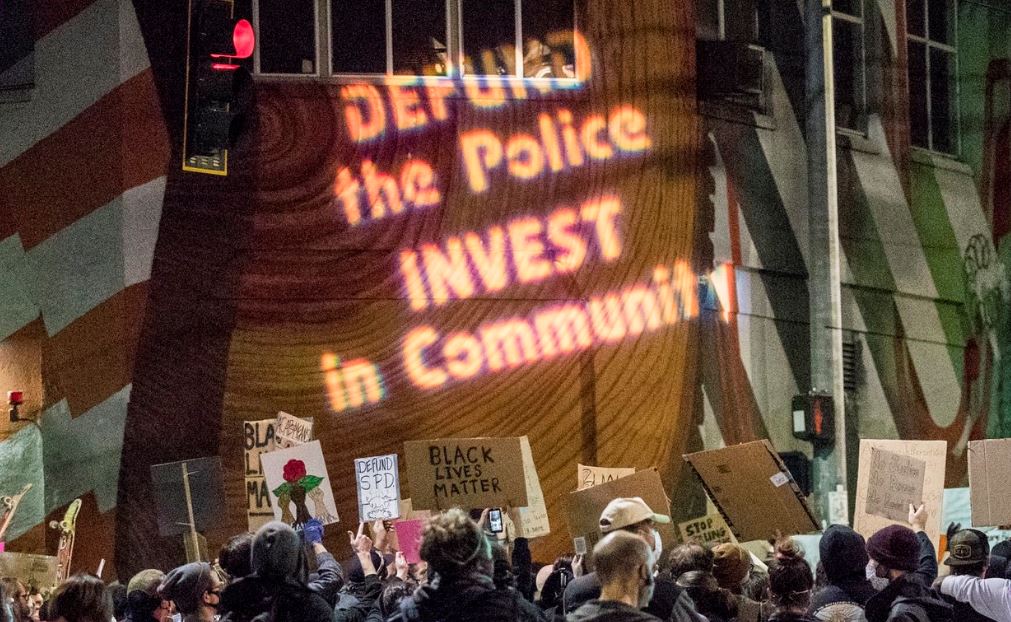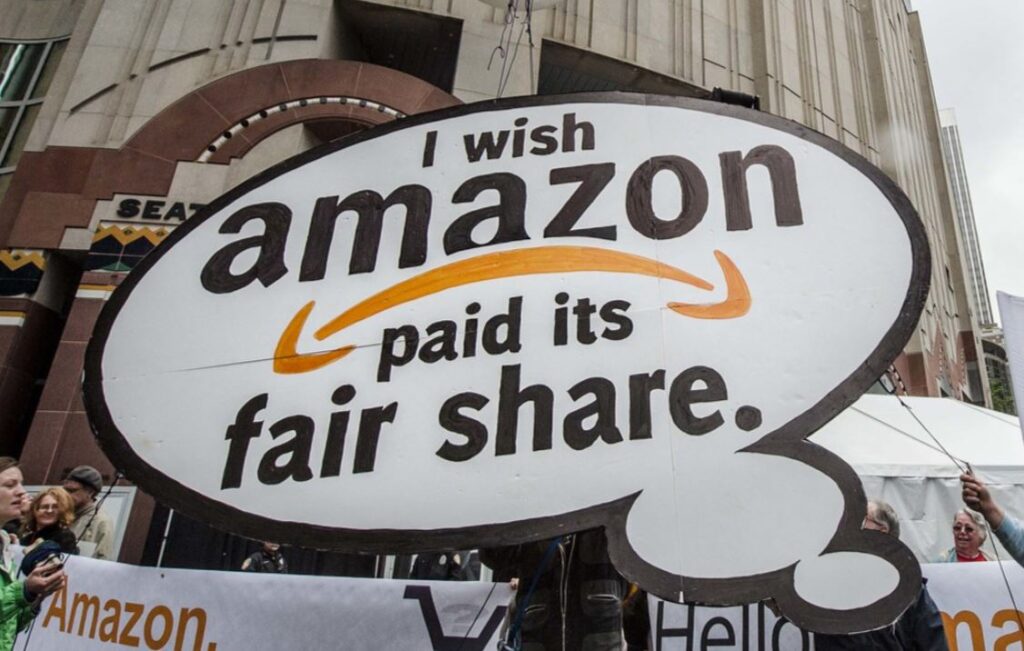Photo: Backbone Campaign, Flickr
Last week we reported on some of the major corporations that fund police foundations across the US, even as these very same corporations tout their support for the Black Lives Matter movement. But there’s even more to this story: many of these corporate backers of the police pay no federal income taxes while receiving billions in corporate subsidies. As calls to defund the police are joined by calls to tax the rich, it’s clear that in many communities the same corporations are both propping up the police and starving Black and Brown communities of the investment they deserve by not paying their fair share in taxes.
A recent report by the Institute on Taxation and Economic Policy revealed that profitable Fortune 500 companies paid just over half of the 21 percent federal corporate tax rate and took in a whopping $73.9 billion in tax subsidies in 2018. An astounding 91 of 379 profitable Fortune 500 companies – ie, about a quarter – “paid effective tax rates of zero or less on their 2018 US income,” and their average effective tax rate was negative 5.9 percent, meaning they received a refund from the IRS. Brought into this context, the minuscule one-time donations and lip service that these corporations give to racial equity are a mockery in comparison to the billions they make in profit, as well as the billions they avoid in paying federal taxes and receive in subsidies.
We found that many of the corporations the ITEP report identified as receiving tax subsidies are the same ones highlighted in our report that are bankrolling police foundations. Police foundations, which are set up to augment already bloated police budgets are the primary vehicle that corporations use to donate money to the police. Unlike municipal budgets, police foundations have fewer restrictions on how the money can be used and are subject to virtually no public oversight. Corporate donations to police foundations allows local law enforcement to purchase military and SWAT equipment such as long guns and drones, which are often used against protesters.
When corporations like Amazon and banks like Wells Fargo put out statements in support of Black Lives Matter, what they fail to disclose is their significant and ongoing sponsorship and partnership with the police, not to mention the benefits they reap from these relationships. In some instances, corporations and banks even go so far as hiring police officers to work security for their businesses through programs like the New York City Police Department’s Paid Detail Unit, making the question of who the police serve and protect ever more necessary to ask. Programs like these also highlight how corporations and banks benefit without paying into the system, and have access to law enforcement personnel trained and outfitted through taxpayer dollars to suppress protests and police communities of color inside their businesses.

Backers of police foundations top list for corporate tax avoidance & tax subsidies
Some of the biggest beneficiaries of tax subsidies identified in the ITEP report – from Starbucks to Amazon, Bank of America to Wells Fargo, Chevron to Delta Air Lines – are also major corporate backers of police foundations across the US. Here are ten of these companies:
- Amazon raked in nearly $11 billion in profits in 2018 while receiving an effective $129 million tax rebate – an effective federal income tax rate of negative 1.2 percent. Amazon was the fourth highest recipient of tax subsidies, receiving $2.404 billion against what it should have paid according to the 21% statutory federal corporate income tax rate.
Amazon is a partner and donor to the Seattle Police Foundation and also sits on the executive committee of its board. The online retail behemoth has been widely criticized for marketing its facial recognition software to police, giving hundreds of police departments access to video surveillance from its Ring cameras, and providing technical services to ICE. An Amazon charitable arm, AmazonSmile, donates to numerous police foundations. Amazon has also come under criticism from its own workers who say – despite the company’s lip service to racial equity – it has a “systemic pattern of racial bias,” with low wages and racism in its warehouses where Black workers are disproportionately employed.
- Starbucks took in nearly $4.75 billion in profits in 2018 while receiving an effective $75 million tax rebate, meaning it had an effective negative 1.6 percent federal income tax rate, according to the ITEP report. The report notes that Starbucks received a total of $1.077 billion in tax subsidies.
Starbucks recently gave $10,000 to $24,999 to the Seattle Police Foundation and $25,000 to the NYC Police Foundations. It also has a board seat with the Seattle Police Foundation and was a 5-star sponsor of its 2019 banquet. The company has also sponsored over 1500 “Coffee with a Cop” programs where police come to Starbucks stores to mingle with customers and workers. Recently, Starbucks faced intense scrutiny for prohibiting employees from wearing Black Lives Matters shirts and pins, saying it could “amplify divisiveness.” (Starbucks has since reversed this policy).

- Bank of America received more tax subsidies than any other company in 2018 – an astounding $5.595 billion. Bank of America is a major donor to police foundations across the US. In 2018, its charitable arm gave a whopping $200,000 to the NYC Police Foundation, as well as $51,250 to the Atlanta Police Foundation, $25,000 to the Boston Police Foundation, and $10,000 to the Los Angeles Police Foundation. Bank of America also has board seats with the Chicago and NYC police foundations.
- Wells Fargo received over $3.2 billion in tax subsidies in 2018 – the third most of any profitable Fortune 500 company. The scandal-ridden bank, which has profited from what the Action Center on Race & the Economy (ACRE) has called “police brutality bonds,” sits on the board of the Atlanta Police Foundation and has sponsored its Blue Jean Ball. The bank is also a donor and partner to the Seattle Police Foundation.
This is a painful time for our nation, and we are saddened by the recent incidents. Our company will continue to do all we can to support our diverse communities. Read more from our CEO, Charlie Scharf
— Wells Fargo (@WellsFargo) June 2, 2020
- Delta Air Lines made over $5 billion in profits in 2018 and received an effective $187 million in tax rebate – amounting to a negative 3.7 percent tax rate. This adds up to $1.252 billion in tax subsidies for Delta – the eighth most of any profitable Fortune 500 company. Delta is the chief sponsor of the Atlanta Police Foundation’s 2020 “Night in Blue” gala and has a board seat with the foundation.
- Chevron took in $4.547 billion in profits in 2018 while receiving an effective $181 million tax rebate – effectively a negative four percent tax rate. All told, Chevron received a $1.136 billion federal income tax subsidy. Chevron has a seat on the Houston Police Foundation’s board and has previously partnered with it to host the North American Mounted Unit Commander‘s Association Conference.
- Verizon Communications received $1.708 billion in tax subsidies in 2018 – the fifth most of any profitable Fortune 500, just behind Amazon. Verizon has a board seat with the Detroit Public Safety Foundation and donates to the Chicago and NYC Police Foundations. It’s also a “Platinum Partner” of the National Sheriff’s Association, as Sludge has reported.
- AT&T received $1.125 billion in 2018 federal tax subsidies – just behind Chevron. According to the Gothamist, AT&T is a “deep-pocketed” donor to the NYC Police Foundation.
Black lives matter and we have a moral and business obligation to engage on this fundamental issue of equality and fairness. Here’s how we’ll drive change through action: https://t.co/AtgEArLUAK pic.twitter.com/ijlLL9oyOw
— AT&T (@ATT) June 12, 2020
- DTE Energy, the midwest utility powerhouses, raked in $1.215 billion in profits in 2018 while receiving an effective $17 million tax rebate – an effective negative 1.4% tax rate. DTE donates to the Detroit Public Safety Foundation board and also has a trustee seat on its board.
- United Parcel Service (UPS) received $1.096 billion in tax subsidies in 2018. A UPS executive is chairman of the Long Beach Police Foundation, while UPS has sponsored Atlanta Police Foundation fundraisers.
Other companies – such as Halliburton – also support police foundations while avoiding taxes or receiving tax subsidies. The ITEP report notes that “[j]ust five companies—Bank of America, J.P. Morgan Chase, Wells Fargo, Amazon, and Verizon—collectively enjoyed more than $16 billion in tax breaks in 2018.” These companies have all been backers of police foundations.
In a recent Baffler article titled “Giving Back to Themselves,” Saritha Ramakrishna examines the creation of police foundations and how the wealthy use them to maintain their power. She writes:
“Police foundations exemplify the corkscrew logic of racial capitalism, whereby the wealthy and powerful weaponize their assets and wealth against the Black communities and others that they have excluded and extracted from. Today’s ongoing protests and calls for abolition follow a long lineage of Black liberatory thought; they demand a new world. This new world necessitates not only the abolition of police forces, but the abolition of the entire system that allows Raytheon executives to forge connections and profit from death and trauma in some hotel ballroom, the system that encourages socialites and corporations to qualify their morality by “giving back” some of the wealth they have acquired through plunder and exploitation. The protests not only imagine the possibilities of life without police, but one unmarred by this corporate extraction.”
Calls for defunding police departments continue to be made around the country, with activists and organizers demanding that the millions and sometimes billions of dollars that go to local police departments be reallocated to things like housing, education, and social services. If corporations are serious when they say “Black Lives Matter,” they shouldn’t just release public statements condemning racism; they should cut ties with police foundations and pay their fair share in taxes to fund investment in Black and Brown communities.
